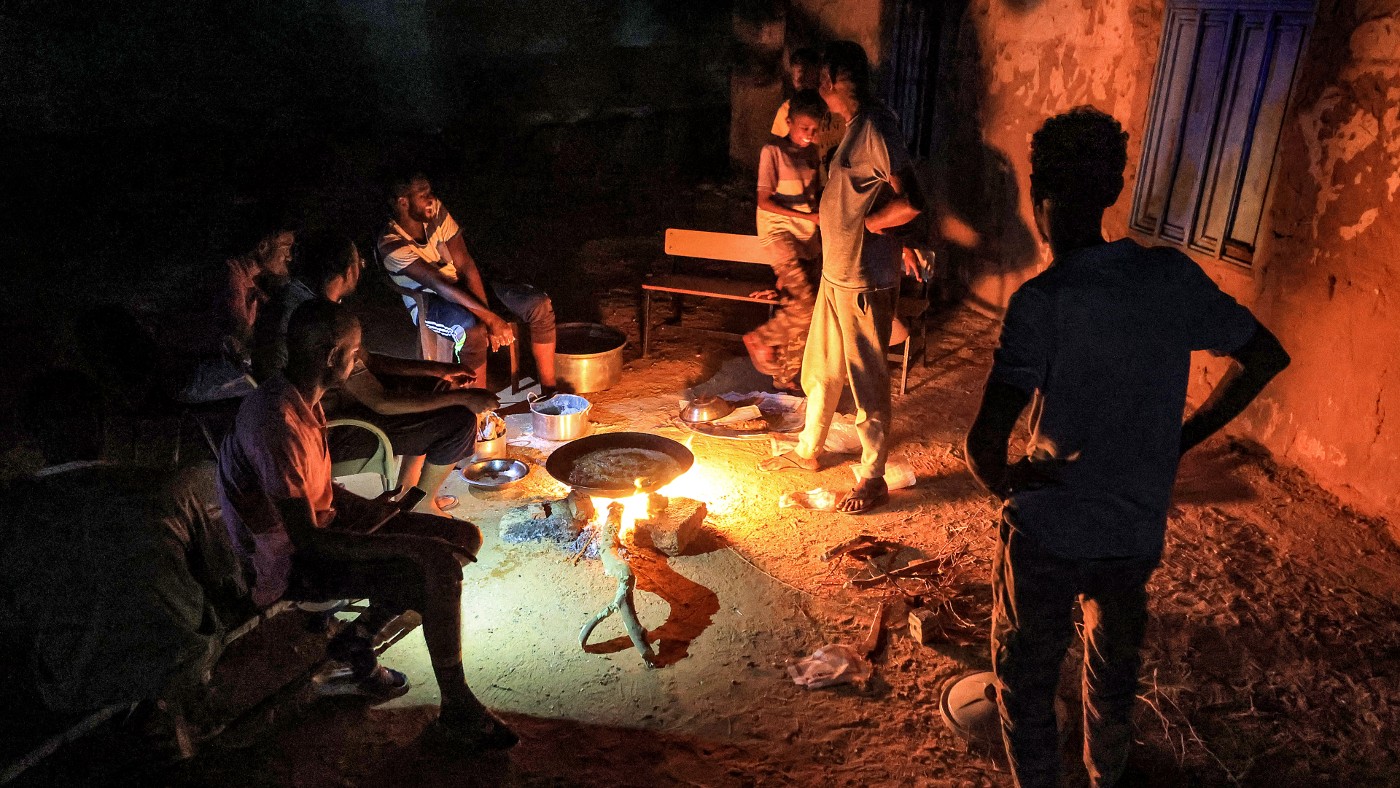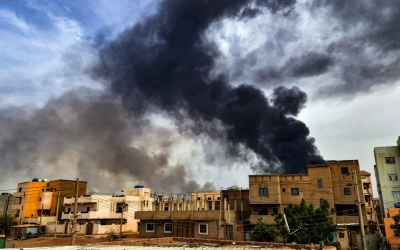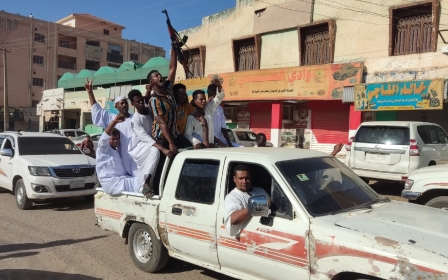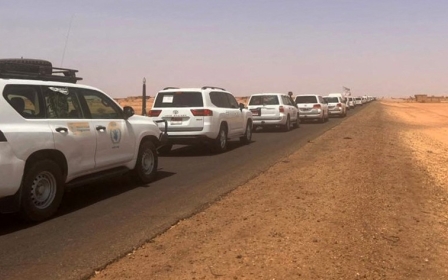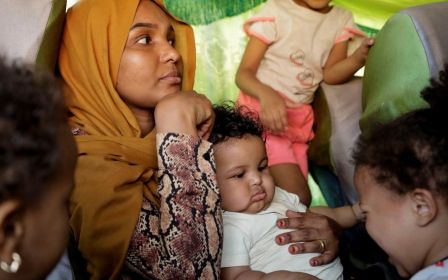Sudanese turn to smugglers to cross border into Egypt
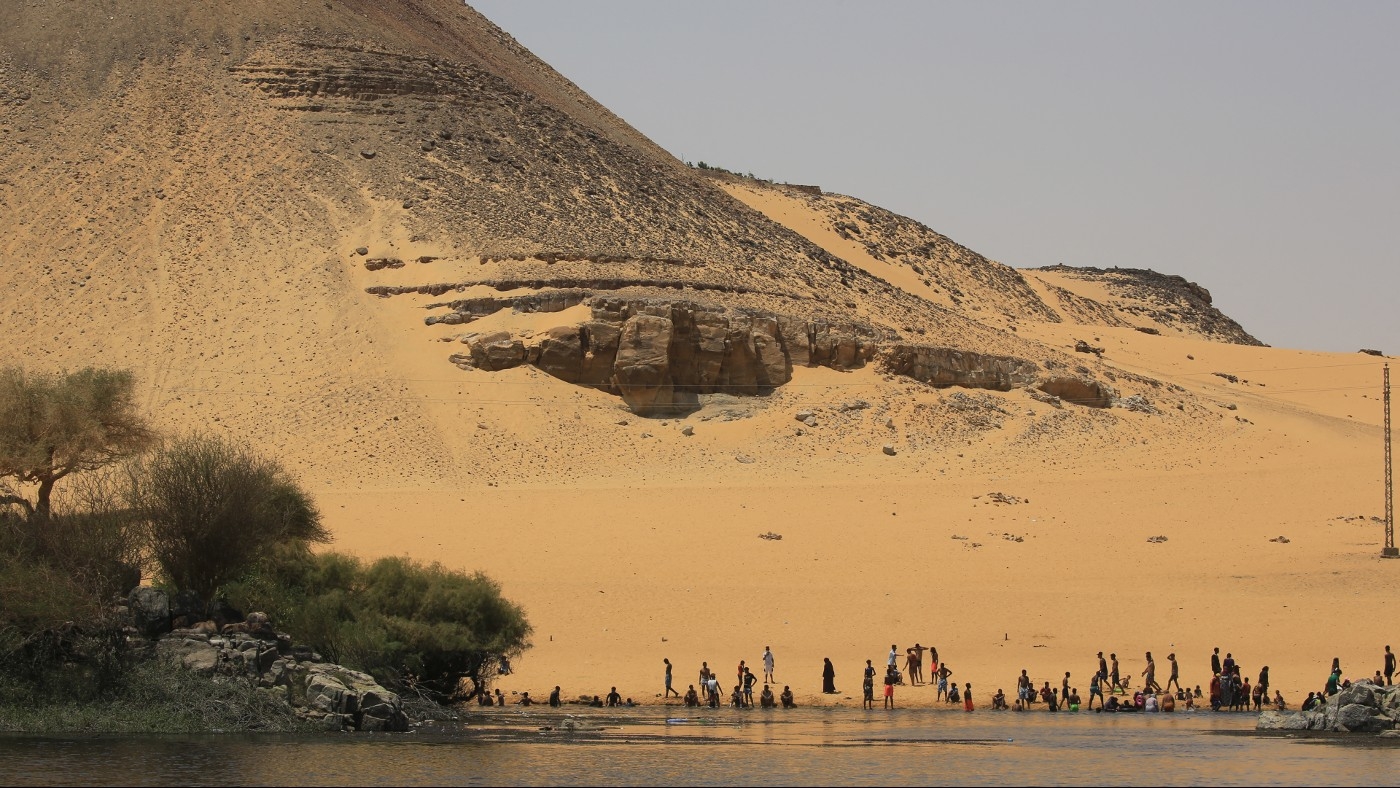
It took Iman Ali, her two children and her parents three nights to cross the border from Sudan, their war-torn homeland, into Egypt.
Guided by smugglers, the family travelled along remote paths in a Toyota Hilux pickup, reaching the southern Egyptian city of Aswan after navigating many obstacles.
“When we got to Aswan my parents were sick and my two children were dehydrated, because we had been sitting under the hot desert sun in the Hilux we rented,” the 35-year-old, now living in the Faisal neighbourhood of Cairo, told Middle East Eye.
The guides who took the family helped keep them away from Egyptian police, she said.
“I have a feeling they are an illegal network made up of Sudanese and Egyptian traders who have ties with the police in both countries,” Iman said.
New MEE newsletter: Jerusalem Dispatch
Sign up to get the latest insights and analysis on Israel-Palestine, alongside Turkey Unpacked and other MEE newsletters
Working as an engineer in Sudan before the war erupted, Iman and her family are among thousands of Sudanese who have been forced to resort to illegal smugglers to cross the border into Egypt’s Aswan province.
Despite freedom of movement, residence, work and property ownership being guaranteed by a 2004 agreement between the two countries, Egyptian authorities have imposed widespread restrictions on Sudanese entering Egypt, including people over 50 and children/under 18s.
These restrictions were put in place following the eruption of the war between the Sudanese Armed Forces (SAF) and Rapid Support Forces (RSF) paramilitary in April last year.
According to the UN, over 1.6 million people have crossed the borders of Sudan into neighbouring countries since then. Around 450,000 of those have gone to Egypt, joining some four million Sudanese already living there.
Smugglers and the police
Wafa Ahmed and seven other family members - her brothers, sisters and parents - moved from the city of Abu Hamad in northern Sudan last December, reaching Aswan after two nights on the road.
They paid about $300 for Wafa’s elderly parents to sit inside a Hilux, and $250 for the rest of the family to sit in the open-air back of the vehicle with other passengers.
“The road was very tough and we drove for 12 hours from Abu Hamad to a location on the border called Alabar, where we stayed the night. The place was very dirty. We paid about $50 for a wooden room, known locally as a rakoba. It was a nightmare, I couldn’t sleep,” said the 31-year-old woman, who is now in Cairo.
Another family coming from Omdurman, twin city of the Sudanese capital Khartoum, said they paid 500,000 Sudanese pounds ($832) per person for each seat in a Land Cruiser, which took them to Aswan in five days.
'We stopped at many police, army and security checkpoints and they… let us through, even though it was clear we were travelling with smugglers'
- Hassan Ibrahim, Sudanese refugee
Wafa said that her family passed three Sudanese checkpoints between Abu Hamad and the Egyptian border.
“I don’t know if they were official checkpoints but the soldiers had Sudanese police uniforms on,” she said. The final checkpoint was a few kilometres before the border.
Mohammed Ahmed, Wafa’s brother, told MEE he saw men in police uniforms and said that the drivers knew each other well.
He couldn’t help noticing odd things that suggested the smugglers, both Egyptian and Sudanese, had ties with the police on both sides of the border, particularly in Sudan.
“When we stopped at the point outside Abu Hamad, I noticed that this area is maybe a gathering point for the smugglers, because I saw other vehicles, including Hilux and Land Cruisers, coming from other cities in Sudan, including Atbara in the River Nile, Omdurman and Port Sudan.”
Another source, who moved from Atbara to Aswan by the same route, told MEE that the police had facilitated their trip.
“I moved with my family in Atbara to Aswan over four days and three nights. Along the road we stopped at many police, army and security checkpoints and they stopped us, inspected our luggage and let us through, even though it was clear we were travelling with smugglers,” Hassan Ibrahim, 53, said.
A bus driver, who asked not to be named for security reasons, told MEE that hundreds of people were being smuggled into Egypt every week and that this was impacting on legal bus operators.
“Since last July, as the entry visas to Egypt from Sudan are very difficult and take a long time, most people come through smuggling, which has negatively impacted our income,” the driver said.
After Iman Ali and her family crossed the border, they replaced their Sudanese guide with an Egyptian, who asked for more money “as we needed to take another road, because the Egyptian police were on their way.
“After a few more kilometres, our guide and driver received a call from someone telling us to change our route from the border and stay the night outside an area called Alkasara,” she told MEE.
The family spent the night in the car in order to avoid arrest.
“When we reached Aswan, the smugglers linked us with brokers who provided us with a small apartment to stay in for the night and sold us sim cards for mobile phones and bus tickets to Cairo,” Iman said.
Taking the same route, Wafa Ahmed entered Cairo at dawn, to avoid police checkpoints.
“When we reached downtown Cairo, our final destination, we had to move quickly from the central bus station because the area is full of police and people who have been smuggled,” she said.
Brokers in Cairo
Once they reach Cairo, Sudanese refugees have to deal with brokers, who mediate their registration with the United Nations High Commissioner for Refugees (UNHCR) or International Organization for Migration (IOM), find them apartments to rent and secure other basic needs.
“Brokers cheated us in terms of renting apartments and exchanging money, among other kinds of exploitation,” Kamal Mahmoud, who reached Cairo at the beginning of February, told MEE.
“We need even to pay for registration at the UNHCR. Despite the registration being free, we needed to pay around 500 Egyptian pounds per person [$16] to do the registration and get the refugee card.”
Queues at the UNHCR office in Cairo run down the street, with thousands of Sudanese refugees waiting to be seen.
Amira Ahmed, a scholar of migration issues and former programme manager at the IOM, said the international community had neglected the crisis and war in Sudan, adding that donors hadn’t paid into the refugee response plan.
“The United Nations agencies, with Sudan’s neighbours, including Egypt, which is the second country after Chad regarding the number of refugees [taken in], have designed what is called the Regional Refugee Response Plan. So far, the donors have only paid 30 percent of the budget,” she told MEE.
Despite signing the 1951 Geneva Refugee Convention and the later protocol of refugee protection, Ahmed explained that Egypt also signed a 1954 memorandum of understanding with the UNHCR.
“According to this, Egypt has shifted its responsibilities regarding the registration, protection and assistance of refugees to the UNHCR.
"In addition, there is no national law for refugee protection in Egypt, so Egypt is dealing with the Sudanese as foreigners, not as refugees,” Ahmed said.
For now, Iman sits in her rented apartment in Cairo. She’s afraid to go out for too long, in case she’s picked up by the police. When the family needs food or other necessities, she makes the journey, always making sure to be quick.
Other than that, they remain indoors, waiting for a life that isn’t lived on the edge.
This article is available in French on Middle East Eye French edition.
Middle East Eye delivers independent and unrivalled coverage and analysis of the Middle East, North Africa and beyond. To learn more about republishing this content and the associated fees, please fill out this form. More about MEE can be found here.


